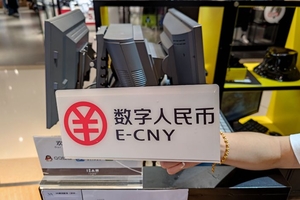China’s Central Bank Digital Currency Will Offer Greatest Privacy Protection, Official Says

China’s central bank digital currency will offer users greater privacy protection than any other digital payment tool, a People’s Bank of China (PBOC) official said.
The digital yuan’s “controllable anonymity” can satisfy individuals’ reasonable needs for anonymous transactions and personal information protection, while helping to maintain financial stability by contributing to the fight against money laundering, terrorist financing and tax evasion, Mu Changchun, head of the PBOC’s digital currency research institute, said Saturday at the annual China Development Forum in Beijing.
China is accelerating the rollout of its virtual yuan. So far, several cities, including Beijing, Shenzhen, Chengdu, and Suzhou, have used the digital currency to provide millions of yuan of coupons (link in Chinese) to local residents since October as part of ongoing pilot programs.
Read more
In Depth: China’s Digital Currency Ambitions Lead the World
Zhou Xiaochuan: China’s Choices in Developing Its Digital Currency System
The digital currency, designed as a replacement for physical cash, can allow anonymous payments up to a certain amount, Mu said. By contrast, other payment tools — including bank cards and the dominant mobile payment platforms operated by Ant Group Co. Ltd. and Tencent Holdings Ltd. — are tied to real-name bank accounts, which precludes anonymity.
Mu said users can open digital wallets with different balance and daily transaction limits based on the degree to which their identity can be verified by the operator. For instance, if a user only supplies their phone number to register an account, the central bank and other operating institutions will not be able to identify them when transactions are made. However, that wallet will have the lowest balance and transaction quotas.
In addition, the digital yuan platform can encrypt users’ payment information before transferring it to e-commerce platforms, which keeps the information out of the hands of the internet giants, according to Mu.
At the same time, controlling risks is a prerequisite for anonymity, Mu said. Technology routes for the virtual currency’s development will be vetoed without hesitation if they fail to meet the requirements of combating money laundering, terrorist financing and tax evasion, he said.
It’s important to strike a balance between privacy protection and fighting financial crimes, and favoring either would cause big problems, Mu said.
Globally, the Bank for International Settlements and seven major central banks including the U.S. Federal Reserve and the European Central Bank have agreed to have payment authentication designs in central bank digital currencies and focus on balancing privacy and combating illegal activity.
Contact reporter Luo Meihan (meihanluo@caixin.com) and editor Joshua Dummer (joshuadummer@caixin.com)
Download our app to receive breaking news alerts and read the news on the go.
Follow the Chinese markets in real time with Caixin Global’s new stock database.

- PODCAST
- MOST POPULAR






